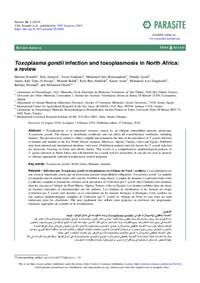Toxoplasma gondii infection and toxoplasmosis in North Africa: a review
Published Date
February 15, 2019
Type
Journal Article

Authors:
Safa Amairia, Yosra Amdouni, Mohamed Anis Boussadoun, Ouarda Ayedi, Amira Adel Taha Al-Hosary, Mourad Rekik, Rym Ben Abdallah, Karim Aoun, Mohamed Aziz Darghouth, Barbara Wieland, Mohamed Gharbi
Toxoplasmosis is an important zoonosis caused by an obligate intracellular parasitic protozoan,
Toxoplasma gondii. It is worldwide distributed in all warm-blooded vertebrates including
humans. The present review aimed to collect, compile and summarize the current data on the
prevalence of T. gondii infection in humans and animals in North Africa. Distribution patterns
and risk factors for Toxoplasma infection were also discussed, focusing on biotic and abiotic
factors in the five North African countries (Morocco, Algeria, Tunisia, Libya and Egypt).
Citation:
Mariem Rouatbi, Safa Amairia, Yosra Amdouni, Mohamed Anis Boussadoun, Ouarda Ayedi, Amira Adel Taha Al-Hosary, Mourad Rekik, Rym Ben Abdallah, Karim Aoun, Mohamed Aziz Darghouth, Barbara Wieland, Mohamed Gharbi. (15/2/2019). Toxoplasma gondii infection and toxoplasmosis in North Africa: a review. Parasite, 26 (6).
Keywords:
north africa
toxoplasma gondii
humans
animals
